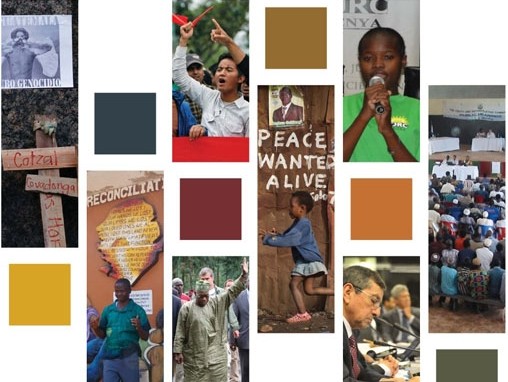As peace talks advance between the Government of Colombia and the FARC guerilla group, an essential element of negotiations is how best to examine the truth about violence and abuses committed during the armed conflict. The creation of a truth commission is now being discussed in Havana.
On February 25, 2015, the International Center for Transitional Justice and the Kofi Annan Foundation will host a conference in Bogotá, titled “Truth Commissions and Peace Processes: International Experiences and Challenges for Colombia.”
The day-long conference will gather major political figures and international and national experts to reflect on lessons learned from truth commissions that have emerged from peace processes around the world and how they may enrich the discussion in Colombia.
Participants will include Mr. Juan Manuel Santos, President of Colombia; Mr. Kofi Annan, Chair of the Kofi Annan Foundation; and Mr. David Tolbert, President of the International Center for Transitional Justice.
“I look forward to sharing our experiences drawn from peace processes and truth seeking initiatives while at the same time learning about Colombia’s own efforts and challenges in this field,” said Mr. Annan. “We hope that experience will be helpful to Colombians as they embark on such an important public discussion.”
The search for truth about the conflict concerns Colombian society as a whole, and the conference will provide space for Colombians from different perspectives to discuss ideas, expectations and questions about the country’s truth-seeking efforts.
Indeed, over the years, civil society groups and some state institutions have made significant progress in collecting, analyzing and publishing information about serious human rights violations and breaches of international humanitarian law committed by all armed actors in Colombia. The National Center for Historical Memory, La Comisión de Verdad y Memoria de las Mujeres Colombianas, and a number of court cases, among others, have helped to shed some light on the conflict.
While these initiatives are important in themselves, they will also be useful in providing information and material for a future national truth commission.
“The truth commission would be at the center of a broader truth-seeking process in Colombia that could focus on issues that have not been adequately addressed yet,” said Mr. Tolbert. “One such issue is the need to establish the responsibilities of institutions, state or otherwise, in connection with serious human rights violations.”
He added, “Even if it is impossible to uncover the truth about each and every violation, the acknowledgment of the suffering of victims is an essential and fundamental contribution that a truth commission can make towards lasting peace.”
Over its lifetime, a truth commission emerging from a peace process is presented with a number of opportunities and challenges, and how it responds to them can enhance or weaken its ability to fulfill its mandate and contribute meaningfully to peace and reconciliation in the society. These include building legitimacy and support across broad segments of society, commissioners interpreting their mandate to serve the greatest interest, engaging marginalized groups such as women and the Indigenous, and leaders seizing the moment of goodwill after the signing of an agreement to establish a strong commission.
An issue of potential relevance is the mandate or design of a truth commission. According to a report published last year by ICTJ and KAF, “Challenging the Conventional: Can Truth Commissions Strengthen Peace Processes,” the mandates of truth commissions have expanded in recent years to cover a growing list of functions and violations.
“It’s a balancing act,” said Tolbert. “In order to be legitimate, the mandate should reflect the real demands of Colombians, but at the same time it must be realistic and accomplished within a reasonable amount of time.”
This conference is part of a joint effort by the International Center for Transitional Justice and the Kofi Annan Foundation to promote and facilitate dialogue on the experiences and lessons learned from truth commissions that have emerged from peace processes. Their joint 2014 report exploring these issues is available in English; a Spanish edition will be launched at the conference.
The conference is organized with the support of the Norwegian Embassy in Colombia and Revista Semana. ICTJ’s work in Colombia is also supported by the Government of Sweden.
Follow the Conference
Watch the conference live on our Spanish website here here. We will also be blogging in English throughout the conference, with summary highlights of the discussions. Follow along and learn more on the conference website here, and join the conversation on our Twitter accounts in English and Spanish.
